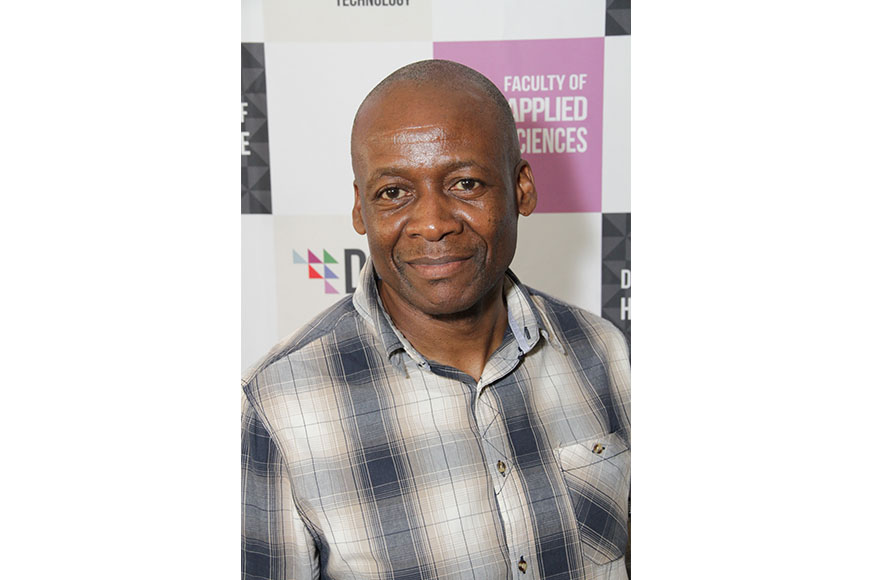Dr Mack Moyo, senior lecturer at the Durban University of Technology’s (DUT’s) Horticulture Department recently obtained an award in the Staff and Student Research Excellence Awards in the category: Departments-NRF Newly Rated Researcher (NRF C2 Rating). The award recognised him for his outstanding contribution in the field of plant science in the Department of Horticulture.
Dr Moyo is elated with his academic achievement and aims to continue achieving greater academic results as he is a results-oriented, versatile and highly motivated individual.
“I love challenges because it’s the impetus for learning and acquisition of new skills and knowledge. I completed my PhD at the Research Centre for Plant Growth and Development, University of KwaZulu-Natal, followed immediately by postdoctoral research with the same research group.
Thereafter, I was a part-time lecturer in the Department of Horticultural Science at Cape Peninsula University of Technology, and then the Department of Science, Mathematics and Technology Education, University of Pretoria. I joined the Horticulture Department at the Durban University of Technology as a senior lecturer, in July 2019,” he said.
In terms of research, Dr Moyo has consistently published in accredited peer-reviewed journals including New Biotechnology, Plant Science, Planta, Plant Growth Regulation, Plant Biology, Journal of Plant Growth Regulation, Scientia Horticulturae, Journal of Applied Phycology, Plant Cell Tissue Organ Culture, Industrial Crops and Products, and Food Chemistry. He indicated that some of the research has been presented at both national and international conferences.
Highlighting his role at DUT, Dr Moyo said that he is involved in teaching, research and external engagements.
“I teach plant science modules in the Diploma in Sustainable Horticulture and Landscaping programme, and Research modules in both the Advanced Diploma and Postgraduate Diploma in Sustainable Horticulture programmes,” he said.
He conveyed that research activities involve supervision of postgraduate research students. Besides teaching and research, he participates in University Committees, for example, the DUT Institutional Review Committee: National Research Foundation (NRF) Masters and Doctoral Scholarship Applications. He is also involved in several external engagements including his role as Review Board Editor: South African Journal of Botany (Elsevier), his participation on the industry advisory board, NRF review committees, and peer review for several plant science journals.
For Dr Moyo, he has always been drawn to the field of plant science and always been fascinated by the wonders of nature especially the diversity in structure, function and physiology of plants. Due to this, studying plant science was a natural choice for him.
In terms of research in the field of plant science, Dr Moyo indicated that his research themes include abiotic stress physiology and phytohormonal (cytokinins and auxins) regulation of plant growth and development.
“Together with my colleagues in the Department of Horticulture, Dr Pravin Mark Maistry and Dr Ignatious Matimati, we are developing hypothesis-driven research on these and other related themes such as plant ecophysiology,” he added.
He commented that it is vital for academics like himself to be constantly researching and also publishing in the field of horticulture as research is important in developing critical scholarship by contributing to the growing body of basic and applied knowledge in the field.
“It is through research that academics contribute to knowledge and become aware of current trends and developments in their respective fields. Ultimately, our research should have a positive impact on society.
At postgraduate level, a research-based teaching and learning approach, in which learners undertake experimental research within their environmental context, is a useful strategy to grow and cultivate interest in the subject,” he said.
He explained that with ENVISION2030, the research undertaken by his department permeates the four perspectives of ENVISION2030.
“Stewardship is key to our research strategy, thus, we seek to inspire innovativeness and nurture responsible professionals. With respective to the systems and processes perspective, we strive to undertake research that contributes applied knowledge in horticulture. This hypothesis-driven applied research has strong emphasis on sustainability and an ultimate focus on knowledge that benefits society,” said Dr Moyo.
The research he conducts and partakes in also involves students.
“This year I hope to register the first cohort of postgraduate students to undertake research on stress physiology of horticultural plants and plant biotechnology,” he added.
Going forward, Dr Moyo’s overarching goal is to engage in partnerships and academic activities that contribute to ENVISION2030.
“In light of this, my first goal is to develop a viable research programme that contributes to training competent and adaptable graduates with critical thinking and problem-solving skills in the field of horticulture.
Secondly, I would like to integrate emerging approaches and technology in my teaching to enrich learning in innovative and creative ways. Finally, my third goal is to grow my external engagement activities through effective professional, industry and/or community partnerships,” he said.
With COVID-19, global warming, and with food shortages around the world, Dr Moyo spoke on how research in the field of horticulture can add value to the issues at hand and globally.
He expressed that knowledge on plant growth and development is fundamental in understanding and redressing universal challenges on food security and biodiversity conservation.
“The global food system has become increasingly homogenous, with less than 30 plant species accounting for more than 95% of human food needs. Part of my research has a strong focus on indigenous food plants, especially vegetables, and understanding the physiological mechanisms that enable these plants to adapt to sometimes extreme environmental conditions e.g. drought.
Incorporation of underutilised crop species in food systems has several potential benefits, including better adaptability to local environments in a changing climate and improved food and nutrition security,” he said.
Dr Moyo stressed that he would like to thank Professor Suren Singh, the Dean: Faculty of Applied Sciences, for his support with research infrastructure for their department; his colleagues-Mark Maistry and Ignatious Matimati, for the many hours of discussions and brainstorming on various aspects of their collaborative research effort; and the Research and Postgraduate Support Directorate for the University Capacity Development Grant (UCDG) seed funding to initiate his research.
Read original article here.

